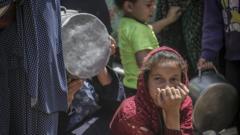The situation in Gaza continues to deteriorate as the United Nations and aid organizations highlight the severe humanitarian crisis exacerbated by Israel's ongoing blockade. Philippe Lazzarini, Commissioner-General of the UN Relief and Works Agency for Palestine Refugees (UNRWA), condemned the denial of food and essential supplies as a “weaponization of humanitarian aid,” pointing to the looming threat of famine.
Palestinian journalists inside Gaza are risking their lives to document the plight of their people, with over 200 having been killed in their efforts. Israel has continuously restricted international media access to Gaza, hindering firsthand reporting on the crisis. Pascal Hundt, from the International Committee of the Red Cross, echoed Lazzarini, emphasizing the overwhelming struggle of civilians who face daily threats and deprivation.
Following Israel's resumption of airstrikes on March 18, after a pause in hostilities, humanitarian assistance has virtually ground to a halt. As a result, families have only moments to evacuate areas targeted by bombardment, leading to mass displacements and further suffering among more than two million residents of Gaza, a significant portion of whom are children.
Lazzarini warned that starvation rates are escalating, with dire predictions highlighting acute food insecurity affecting the entire population. An alarming report by the Integrated Food Security Phase Classification indicates that around 470,000 people in Gaza are classified as "Phase 5 – catastrophe," experiencing extreme shortages, malnutrition, and risk of death from starvation.
The international community has reacted angrily, with accusations of Israel committing war crimes as it employs food deprivation as a strategy against Palestinians. While Israeli officials assert that all humanitarian aid is being controlled by Hamas, UN representatives firmly refute these claims, stating that Israel's actions are perpetuating a humanitarian crisis.
As tensions build, Netanyahu’s government faces backlash, both domestically and internationally. Dissent has risen among military reservists who claim they are fighting for political motives rather than genuine security needs.
With conflicting narratives surrounding the blockade and escalating violence, the humanitarian crisis in Gaza reveals deeper political complexities. The potential for war crimes and accusations of genocide loom large as Lazzarini cautions that the fallout from this conflict could resonate for years, influencing historical perspectives on international accountability and moral responsibility.
In contrast, global responses continue to evolve, with even former supporters distancing themselves from Israel's leadership, casting doubt on long-term prospects for peace amid a landscape rife with suffering and escalating hostilities.


















